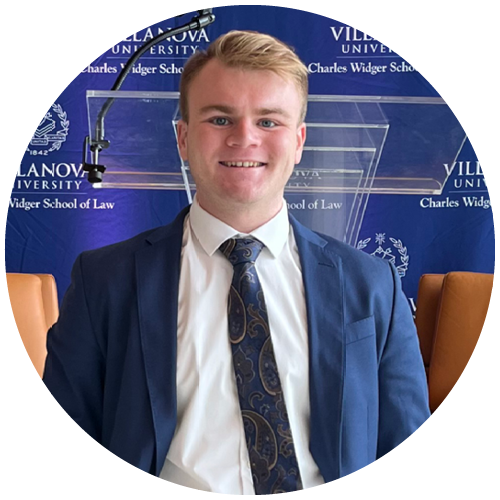Classroom to Courtroom: Constitutional Law
Often viewed as one of the most difficult law courses, Constitutional Law, a required course for 1L law students, teaches the foundation of the United States legal system and serves as a rite of passage for aspiring lawyers. In the summer of 2024, two Villanova Law students saw their Constitutional Law classroom experience come to life in the courtroom while serving as summer externs.
After completing their 1L year, Margo Chapin ’26 and Garett Oliver ‘26 held judicial externships with the United States District Court for the Eastern District of Pennsylvania at the James A. Byrne U.S. Courthouse in Philadelphia. Chapin worked for the Hon. Gerald J. Pappert and Oliver externed with the Hon. Joel H. Slomsky, and both students assisted clerks with research and assignments. As externs, they were also permitted to view other proceedings at the courthouse with different courts and judges.
“I would often go into a hearing or proceeding in a different judge’s courtroom,” said Chapin, a Brooklyn, NY native and graduate of John Hopkins University. “I really enjoyed watching lawyers and their practice skills—how they presented themselves in court and addressed the judge and their opposing counsel. It was especially interesting to see how judges ruled on specific issues.”
Oliver echoes Chapin’s enthusiasm. “Not only did we get to see cool legal issues, we got a preview of what it’s like to argue in an appellate setting,” he said. “Working at the courthouse was an amazing learning experience. I was exposed to an entirely new area of law, and I was given a ton of responsibility.”
One case they both observed in the United States Court of Appeals for the Third Circuit sparked their interest because it related to their Constitutional Law coursework. “The issue in the case was whether a particular federal statute was unconstitutional,” said Oliver, a University of Connecticut graduate from Litchfield, CT. The defendant, a US citizen living abroad, had been charged with a crime in the United States, even though they engaged in criminal conduct outside the United States.
“The defendant argued that the statute he was charged under was unconstitutional, invoking the commerce clause and the necessary and proper clause,” said Chapin. “As part of my Constitutional Law course, we learned that the commerce clause is a specific provision that allows Congress to regulate things that have to do with commerce, but it doesn’t give Congress the ability to have a general police power.”
In both Chapin’s Constitutional Law class, taught by Professor Patrick Brennan, John F. Scarpa Chair in Catholic Legal Studies, and in Oliver’s class, taught by Professor Tuan Samahon, Director, International Programs, students focused on domestic cases of the commerce clause, while the case Chapin and Oliver observed in the Third Circuit involved the foreign commerce clause.
“Professor Brennan walked us through the history of the commerce clause dating back to the 1800s,” said Chapin. “We studied how it had been applied to litigation for the past 200 years through today. One of the specific cases we studied, United States v. Lopez, was named by the attorneys and the judges during this Third Circuit argument. That perked my ears up. It was exciting because the same cases we studied apply within this area of the law, but this time, it was being extended and applied to a foreign fact pattern. The tension within this area of law is whether or not Congress has the power to reach outside the U.S. to regulate something its citizen is doing abroad.”
Oliver added, “In Professor Samahon's class, we also studied United States v. Lopez, a case in which the Supreme Court ruled that conduct reached by the domestic commerce clause must be commercial or economic in nature. In the Third Circuit case, counsel for the criminal defendant drew on a similar line of reasoning, arguing that the statute Congress enacted pursuant to the foreign commerce clause was unconstitutional as applied to the defendant because his conduct was not economic or commercial.”
Chapin and Oliver are interested in pursuing a legal career in litigation after graduating from Villanova Law. “My experience at the court this summer made me realize I love litigation,” said Chapin. “It was fascinating to watch lawyers in court. I love the creativity they use when making arguments, but also the structure of procedure they must follow to keep things efficient and fair for everyone.”
Oliver added, “I am very grateful for all the doors Villanova Law has opened for me. As a law student, I’ve built many great connections and friendships. Villanova has really enabled me to excel.”
For summer 2025, Chapin and Oliver secured externships at law firms in New York City.


